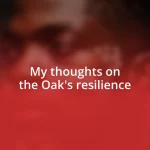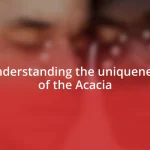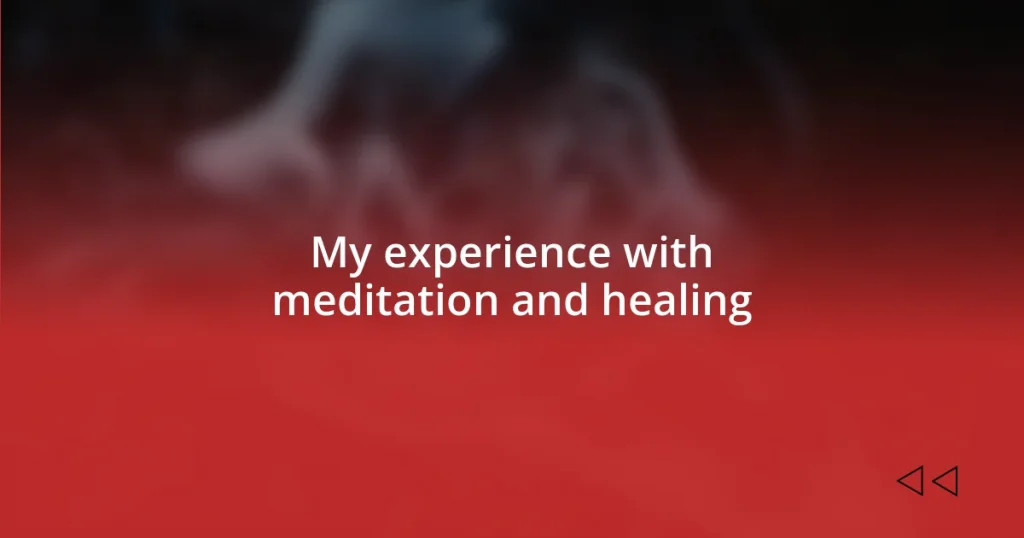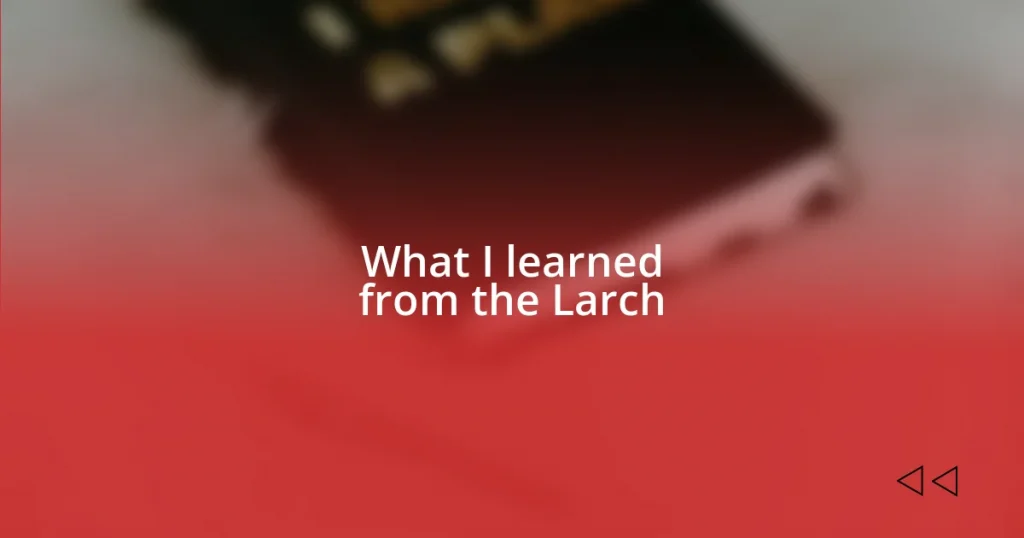Key takeaways:
- Regular meditation fosters emotional awareness, reduces stress, and enhances clarity and focus, transforming one’s mental landscape and improving relationships.
- Experimenting with various techniques like mindfulness meditation and loving-kindness meditation can deepen one’s practice and connection to self.
- Integrating meditation into daily life, even through small moments of mindfulness, can significantly enhance overall well-being and appreciation for life’s simple pleasures.
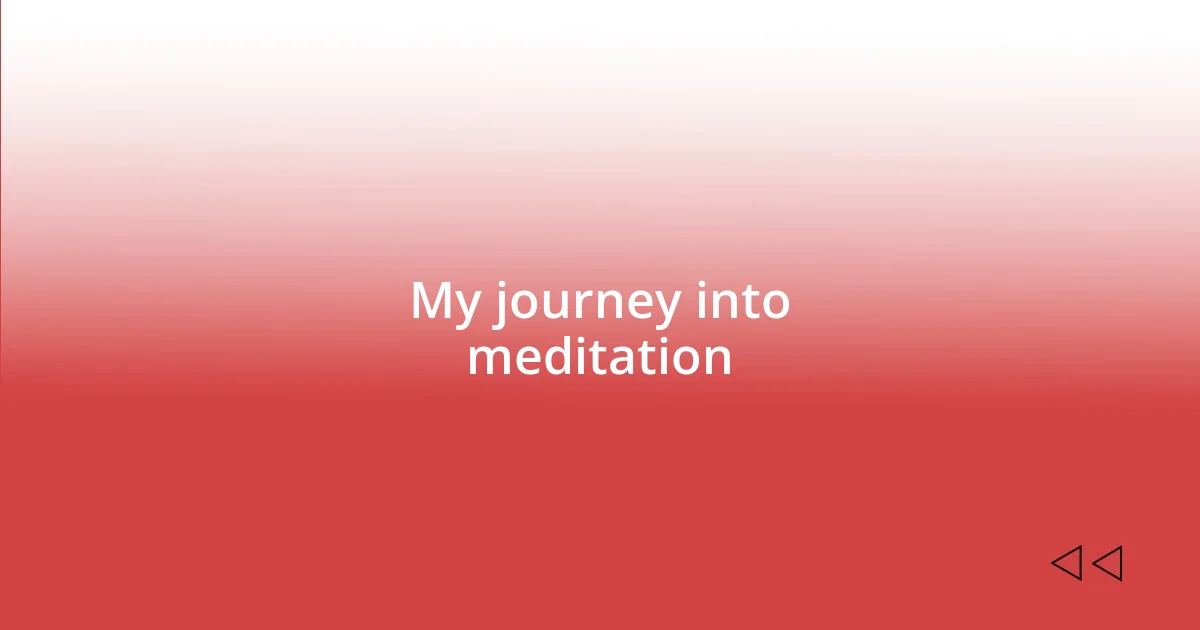
My journey into meditation
I remember the first time I sat down to meditate. I was skeptical, my mind racing through a million thoughts, and it felt almost impossible to quiet the chaos. But then, something shifted after just a few minutes; I discovered a stillness I hadn’t known I was craving. Have you ever felt that longing for peace amidst the noise of life?
As I committed to a daily practice, my initial struggles slowly transformed into a sanctuary for my thoughts. I found myself becoming more aware of my emotions rather than getting swept away by them. There was one morning when I sat with a heavy heart, but through meditation, I uncovered a profound sense of acceptance. It was like meeting myself for the first time.
Over time, I noticed that meditation wasn’t just about quieting the mind; it was about fostering a deeper connection within myself. I started exploring different techniques, like guided meditations and breathwork, which unlocked deeper layers of healing. Have you ever explored those options? It’s incredible how these practices can guide you back to your own heart and wisdom.
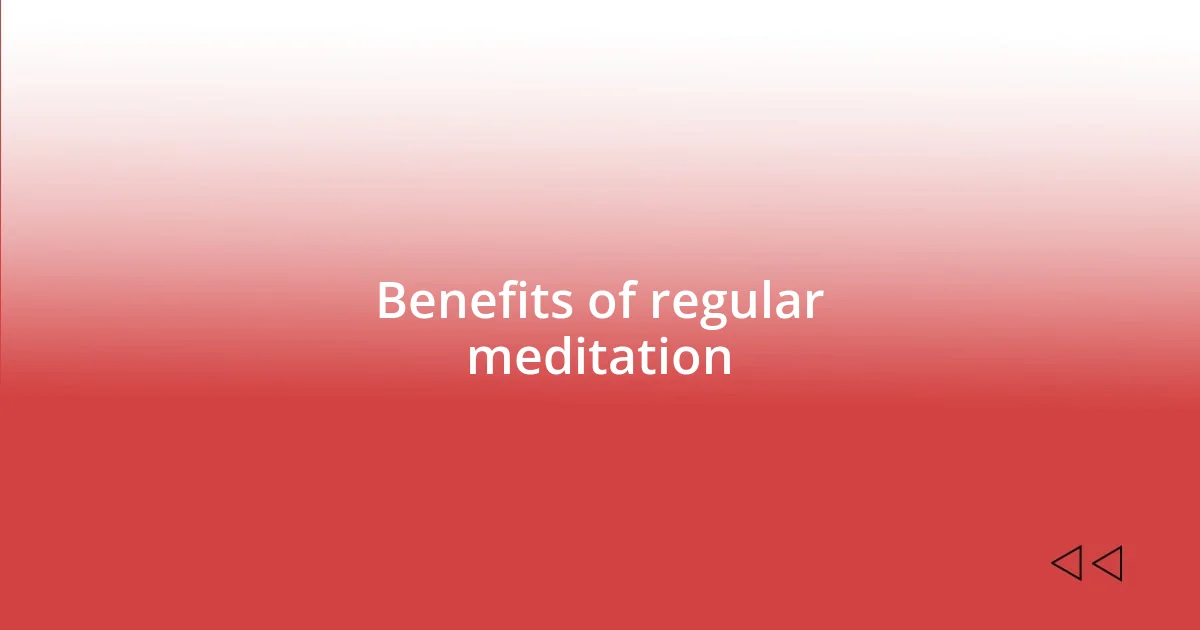
Benefits of regular meditation
Regular meditation offers an array of benefits that can profoundly impact one’s life. Personally, I’ve experienced an enhanced sense of clarity and focus. There are days when I find it difficult to concentrate, but after a few minutes of meditation, my thoughts feel more organized, allowing me to tackle my tasks with renewed energy. Isn’t it remarkable how just a short time spent in quiet reflection can shift our mental landscape?
Another key benefit I’ve discovered is the incredible reduction in stress levels. Initially, I approached meditation with the hope of calming my racing thoughts, but it turned into a practice that actually alleviated my stress. I vividly recall a challenging day at work when anxiety seemed to overwhelm me. A brief meditative session helped me regain my composure and approach the situation more mindfully. Have you ever found yourself in such a scenario?
Moreover, meditation cultivates a profound connection to our emotional well-being. I’ve noticed that as I meditate regularly, I become more attuned to my feelings and reactions. For example, during times of confrontation or difficulty, I have developed the ability to pause, breathe, and respond rather than react impulsively. This emotional awareness has transformed my interactions and allowed for deeper connections with others.
| Benefit | Personal Experience |
|---|---|
| Enhanced Clarity | Organized thoughts after meditation boost my focus and productivity. |
| Reduced Stress | A brief meditation effectively alleviated my anxiety during a challenging day at work. |
| Emotional Awareness | Regular practice fosters a deeper understanding of my feelings, enhancing my relationships. |
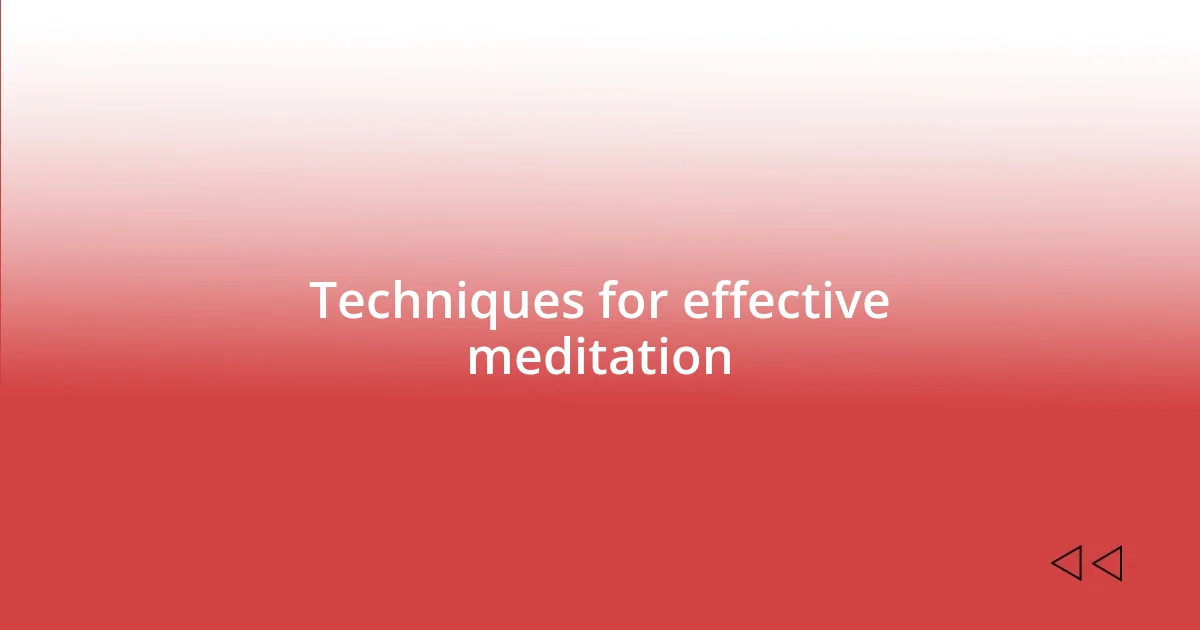
Techniques for effective meditation
Meditation techniques can vary widely, but I’ve found that experimenting with different approaches is key to discovering what resonates best with me. One of my favorites is mindfulness meditation, where I focus my attention on my breath or the sensations in my body. I recall one peaceful afternoon when I immersed myself fully in this practice; it felt as if time melted away and the world around me faded. Such moments always remind me that this practice is about being present, rather than achieving a specific state.
Here are some techniques that I’ve discovered to enhance meditation effectiveness:
- Mindfulness Meditation: Focus on your breath or body sensations, cultivating awareness without judgment.
- Guided Visualization: Use audio guides to immerse yourself in calming imagery; it’s like a mini-vacation for your mind.
- Body Scan: Slowly focus on each part of your body, promoting relaxation and bringing attention to areas of tension.
- Loving-Kindness Meditation: Send thoughts of goodwill and compassion to yourself and others; I feel my heart expand with each repetition.
- Chanting or Mantras: Repeating specific phrases can create a vibration that resonates deeply, providing a comforting rhythm.
I’ve also embraced a practice of gratitude during my meditations, recognizing what I’m thankful for. One particularly touching moment unfolded on a chilly morning when I focused on my family and friends. It filled me with warmth and transformed my meditation from a solitary exercise into something that connected me deeply with the people I cherish. How do you feel when you acknowledge what you’re grateful for? It can completely change the energy of your practice.
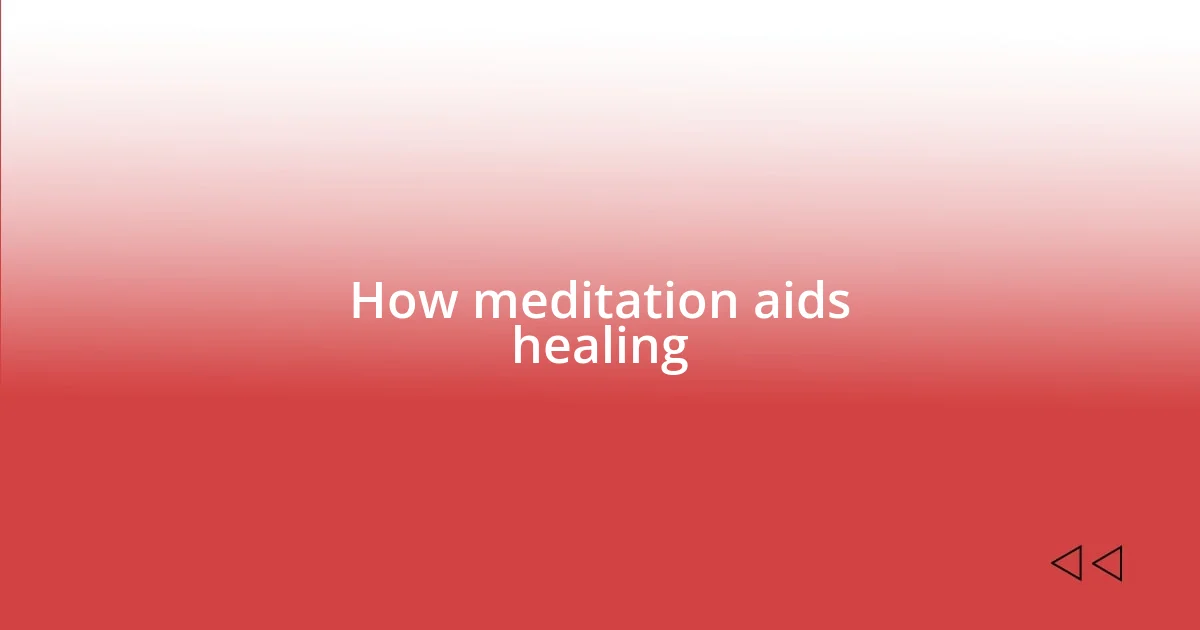
How meditation aids healing
Meditation acts as a natural healer by encouraging a deep sense of relaxation, which is often where true healing begins. I remember a period when I was grappling with persistent headaches. After adopting a meditation practice, particularly focusing on breathing techniques, I found that my headaches started to ease. It felt like I was giving my body permission to let go of the tension, leading to a profound sense of relief. Have you ever felt physical discomfort melt away after a period of focused stillness?
Not only does meditation facilitate physical healing, but it also plays a crucial role in emotional recovery. I once participated in a group meditation session focused on healing past traumas. During that session, I was surprised by the flood of emotions that surfaced. Instead of feeling overwhelmed, I felt a wave of catharsis wash over me, allowing me to experience and release feelings I’d buried for too long. It’s astonishing how confronting emotions can lead to healing—have you ever let yourself simply feel during meditation?
Moreover, the practice of meditation encourages mindfulness, which has a powerful ripple effect on our overall well-being. I’ve noticed that as I meditate, I approach my daily challenges with greater patience and resilience. For example, during a recent family gathering where tensions ran high, I found myself calmly responding rather than reacting. By being present and mindful, I was able to navigate the situation with grace, turning potential conflict into an opportunity for connection. How has being present helped you in your interactions?
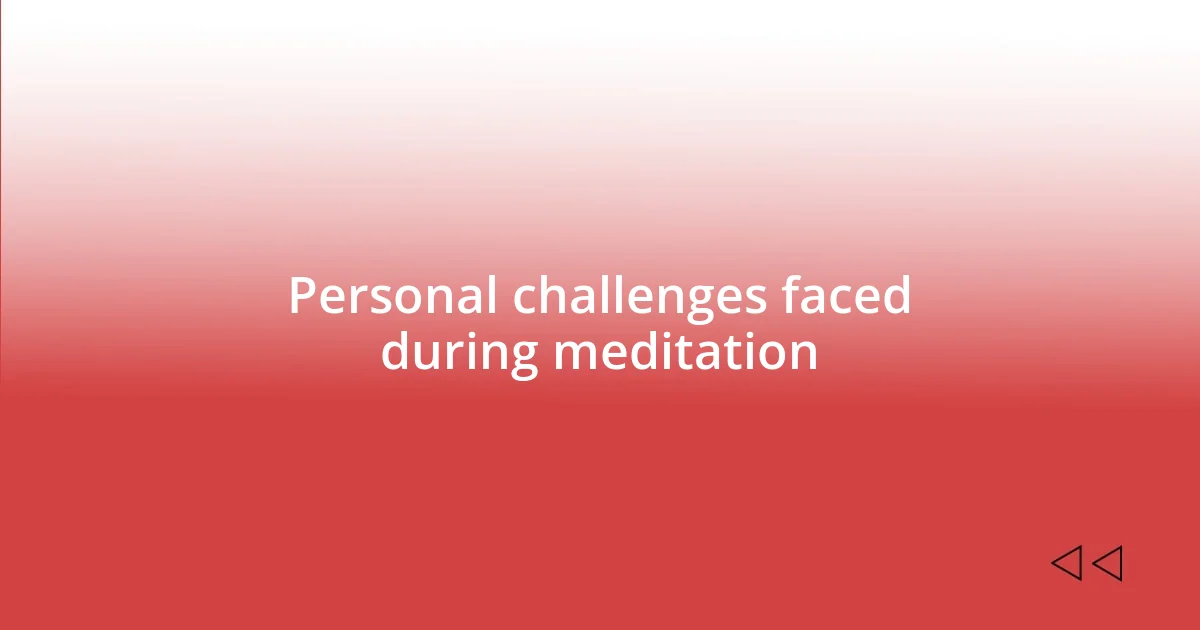
Personal challenges faced during meditation
Meditation is often portrayed as a serene experience, but I’ve faced my fair share of challenges. One of the most significant hurdles for me was dealing with my ever-busy mind. I remember sitting down, determined to meditate, only to find my thoughts racing through my to-do list like a runaway train. Have you ever noticed how the moment you sit in silence, your mind suddenly becomes a chatterbox? I learned that acknowledging these distractions without judgment was key to moving forward, transforming frustration into a tool for mindfulness.
Another personal challenge emerged when I struggled with physical discomfort during meditation. There were times when sitting still for even a minute felt unbearable, as my body seemed to voice its impatience. It took some experimentation to find a comfortable position that wouldn’t trigger my restlessness. I discovered that modifying my posture and even incorporating short periods of gentle stretching before meditation could make a remarkable difference. Have you explored how your physical state affects your meditation practice?
Lastly, emotions can rise unexpectedly, creating a complex landscape during meditation. I vividly recall a moment when sadness unexpectedly washed over me. Instead of shying away from it, I leaned in, allowing myself to feel fully. It was powerful to realize that, by addressing these emotions, I could facilitate my healing journey. Have you experienced a similar moment of vulnerability during your practice? Embracing these emotional waves has ultimately deepened my connection to meditation and myself.
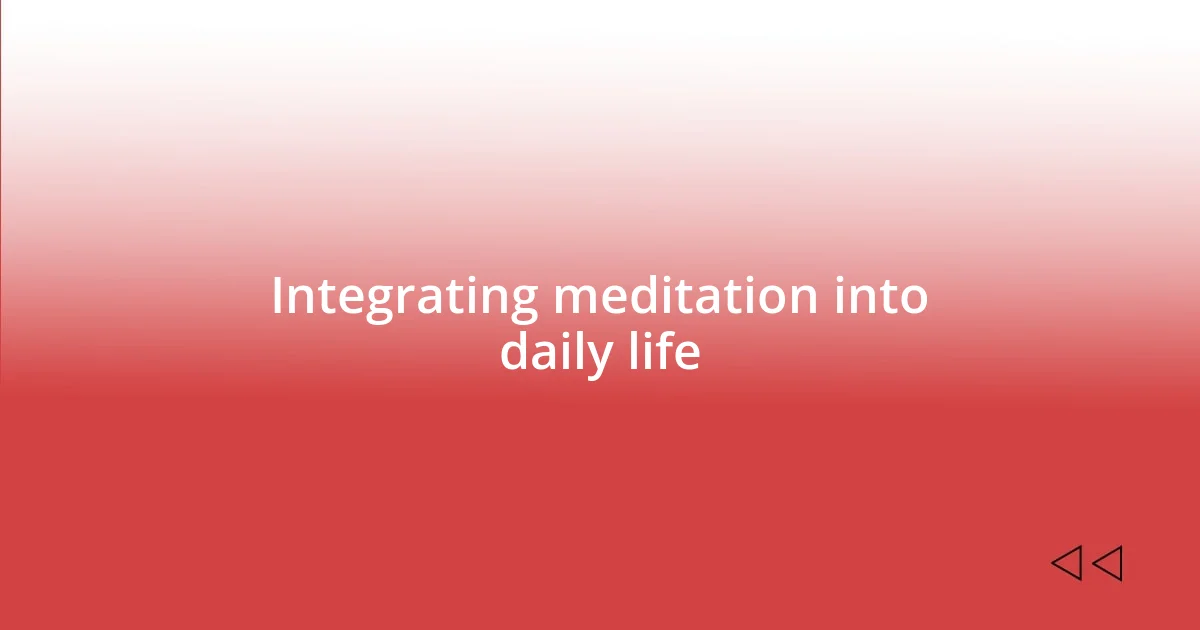
Integrating meditation into daily life
Incorporating meditation into daily life has been transformative for me. For a while, I struggled to find the right time to meditate between work and family responsibilities. However, I started setting aside just five minutes each morning after I woke up. That small commitment created a routine that paved the way for more extended sessions as I grew comfortable. Have you found a specific time that works best for you?
I remember an afternoon when I felt particularly stressed after a challenging meeting. Instead of letting that tension carry over into my evening, I took a moment to step outside for a quick breath-focused meditation. Just a few deep breaths allowed me to reset my mood and approach the rest of my day with renewed energy. It’s fascinating how even a brief pause can alter our perspective—do you give yourself those opportunities to breathe during your busy days?
In my journey, integrating meditation became less about setting aside time specifically for it and more about weaving it into everyday activities. I began practicing mindfulness while washing dishes or walking the dog, focusing on the sensations around me instead of letting my mind wander. It’s incredible how pockets of mindfulness can surface during mundane tasks. Has that approach resonated with you? Finding meditation in these small moments has deepened my appreciation for life’s simple pleasures.
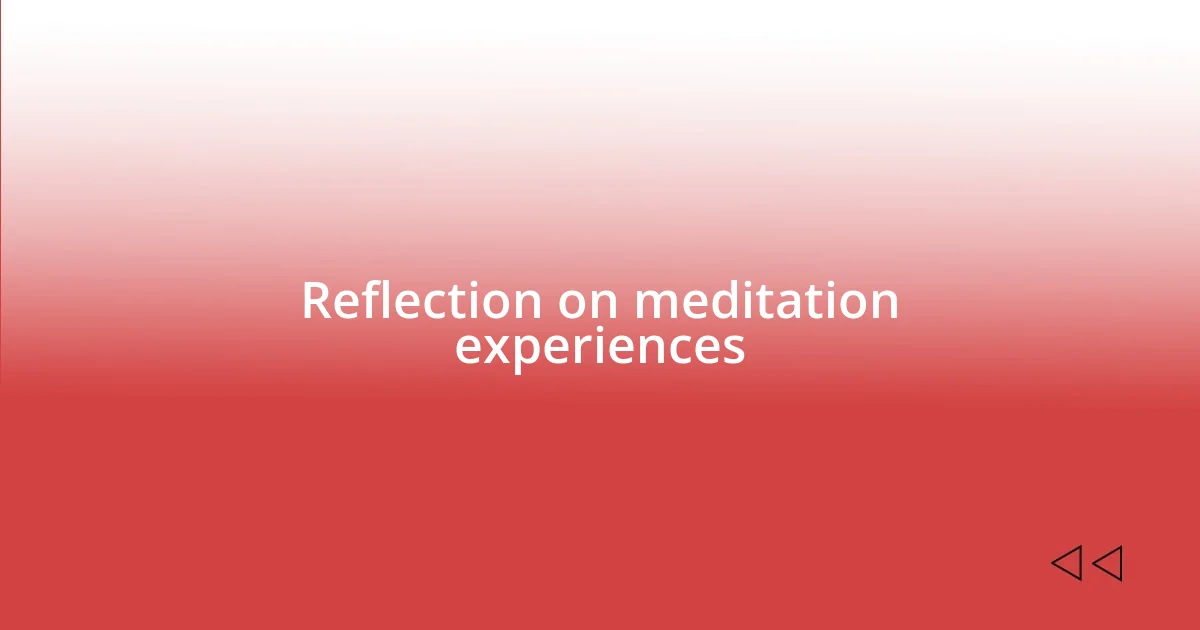
Reflection on meditation experiences
Reflecting on my meditation experiences, I’ve often been amazed at how introspection can unveil layers of self-discovery. For instance, during one session, I stumbled upon a memory that I had long buried. Suddenly, the floodgates opened with emotions that surprised me. Have you ever felt like a forgotten piece of your history resurfaced just when you thought you had moved on? Embracing that moment was both illuminating and daunting, yet it reminded me that our journey in meditation often leads to unexpected revelations.
I’ve also noticed that my meditation practice has taught me the importance of patience. There were countless times I anticipated a sort of peaceful epiphany, only to find myself challenged with restlessness instead. Those sessions where I felt like I was “doing it wrong” became a lesson in patience. How many times do we hold ourselves to impossible standards, even in our personal growth? Each experience, no matter how imperfect, turned into an opportunity to cultivate compassion toward myself, reinforcing that the journey itself is just as valuable as the destination.
Lastly, I often reflect on the way meditation allows me to reconnect with my body. One quiet session, I became acutely aware of the tension I was holding in my shoulders. Just that realization alone shifted my entire practice. I began to intentionally breathe into those areas, and it was as though a weight had been lifted. Have you ever felt that release during your meditative moments? Those reflections serve as reminders that meditation isn’t just about stillness but also about nurturing our relationship with ourselves, both physically and emotionally.






